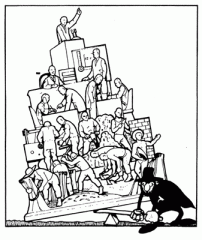By Snorri Páll Jónsson Úlfhildarson, originally published in Morgunblaðið –
In his article, “Is There Enough Aluminium in the World?” Jakob Björnsson, former director of energy affairs points out that “by far the biggest part of alulminium usage in the world today is in the industrial countries, where 25% of the people of the world live.” He also mentions that when China and India will have gone through proper indutrialization, 62% of humanity will live in industrial countries and the other 38% are also on their way there; that they want to enjoy the indstrialized countries’ living standards, even dream of cars and beer cans. These are very important facts.
Two things make Jakob’s article very interesting. Firstly, he says that it is a realistic oppurtunity that all human beings on the planet can reach the “qualities of life” and lifestyle that Occidentals now live with. Secondly, he states that human equalitiy is possible inside the system we live in.
Western society has been associaded with prosperity, which is said to be for the good. It is said to be a sign of success and progress. But what is the prosperity based on? What is sacrifized for the so-called life qualities?
20% of humanity consumes 80% of earth harnessed resources. The western ecological footprint is way to big for this planet. Considering the fact that unindustrialized countries are getting near to us when it comes to industrialization, production and consumption, it is clear that radical changes are needed.
And these changes can not include new “techno-fixes” that are supposed to solve the problems of the natural environment. They can not be fake sollutions, pretending that the western way of living can ever be positive for the earth, that we can really have positive impacts without radical changes of the consumer culture. The fact is this: We need to go back!
This lifestyle is not sustainable and will never be. That as easy as it gets. The word sustainability does not fit our society in any context. Capitalism does not assume sustainability, because it spins around constant economic growth and contantly increasing parallel aggressiveness. Therfor, capitalist society will never be environmentally friendly.
Corporations and authorities introduce to the public several actions, said to be real sollutions, but none of them assume real, radical changes. They are all centred upon continued production; selling and buying. When e.g. “green” cars are mentioned, the production process is never dealt with. Mining, transport, enormous usage of water and under-paid workforce in the third world – all of these fundamental parts of the production are kept away.
The goal is of course to keep the consumption pattern unchanged without attcking the roots of the problems. Peole are not encouraged to drive less, not to mention even stop driving. People are still supposed to buy new, nice looking cars every few years; and the society is still being organized with the benefits of car owners in mind. New highways are constantly being built and old ones enlarged.
This lifestyle, this culture, can not be taken up by the whole of humanity. The earth is not cabable of it. It means that we have to go back if the whole humanity is ever supposed to be able to be on the same line. We can neiter continue the so-called progress nor stand still.
And than we come to Jakob’s second point; that by time, equality can possibly be reached inside the system we live in. I hardly doubt that he believes this himself – and to be honest, I doubt that he, the primary spokesperson for the aluminium industry here in Iceland, really wants equality. Capitalism does not assume equality, but rather the complete opposite: Capitalism thrives on inequality. Just as big food producers and other big corporations, the aluminium companies thrive on inequality. The situation of the indigenous tribes of Orissa in India is a great example.
Jakob states that the tribes are on their way to industrialization like all other Indian people. The Orissa inhabitants that I have talked about in my prior articles here in Morgunblaðið, live on bauxite resources and fight heavily against bauxite mining, the destruction of ecosystems and their own extermination. The only thing the bauxite mining does to them is to dismantle their lands and livelihoods, as well as their lifestyle, language and culture. Their poverty will not be exterminated, but they will rather be fundamentally pushed into poverty. People will be banished from their sustainable communities, into the cities where nothing waits for them expect boring factory jobs and poverty. And more likely, they will fight for their lives to the last drop of blood. That is how capitalism works.
Coca Cola and a range of other companie have destroyed and polluted water, e.g. in India, and had to do with the murders of worker’s union leaders, e.g. in Columbia. The basic needs of Alcoa’s workers in Honduras and Mexico have been ignored, workers have been fired for organizing unions and their wages are only high enough to live up to one third of what they need to sustain their families and homes. Clothes companies run operate their factories in countries where they can pay their workers as lowe wages as possible; huge fields of land, forests and lakes are destroyed for the production of luxury items for the western countries. Is this maybe the equality that Jakob is talking about?
Capitalism on the one hand and equality and sustainability on the other, do not have anything in common. Neither one assumes the other and they simply do not work together. Reforms inside the system will have no good impacts, since they are not even made to have any good impacts. The only real sollution to the world’s problems is the extermination of capitalism.
